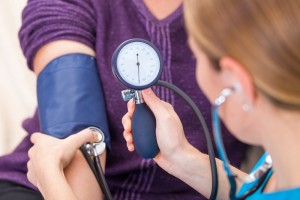 The charity is organising free blood pressure checks at thousands of ‘pressure stations’. Since its 2001 launch over 1.5 million people have had a check and now know their blood pressure numbers.
The charity is organising free blood pressure checks at thousands of ‘pressure stations’. Since its 2001 launch over 1.5 million people have had a check and now know their blood pressure numbers.
Symptoms of high blood pressure
Many meople mistakenly believe that there are specific symptoms relating to high blood pressure, but it is largely a symptomless condition. This is why it is called the ‘silent killer’.
If you have extremely high blood pressure you may have:
- severe headaches
- tiredness or confusion
- sight problems
- pain in your chest or breathing problems
- irregular heartbeat
- blood in your urine
Causes of high blood pressure
The exact causes are not known but the following play a part:
- smoking
- being overweight
- lack of physical activity
- drinking too much alcohol
- eating too much salt
- pre-existing conditions, for example, kidney disease
- family history
- age
The results of high blood pressure
High blood pressure can result in:
- strain on your heart and blood vessels
- increases your chance of a stroke or heart attack
- heart disease
- kidney disease
- dementia
‘Know your numbers’
Healthy adults over the age of 40 should have their blood pressure checked at least every 5 years. If you at higher risk you should have it checked at least once every 12 months.
A normal blood pressure reading should be below 120 over 80 mmHg (120/80). You can find out where to get your blood pressure checked on the Blood Pressure UK website.
You can also ask for a check at you GP surgery.
If your blood pressure is higher than 120/80 you should take steps to bring it down by eating less salt, drinking less alcohol and eating more fruit and vegetables and doing more exercise.
By Petra Heath, medical negligence solicitor.

